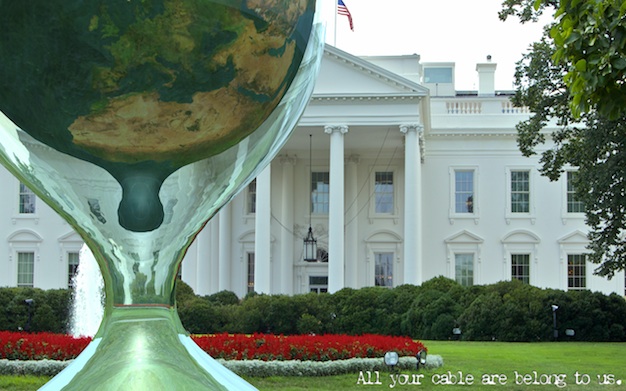 Next: Supreme Court judges took bribes to validate Yar'Adua/Jonathan election
Next: Supreme Court judges took bribes to validate Yar'Adua/Jonathan election
"We had just had elections in 2007 that, by most accounts, were possibly worst ever, and the legitimacy of the presidential poll that the authorities had declared won by Umaru Yar'Adua and his running mate, Goodluck Jonathan, hung in the balance.
Justices of our Supreme Court, the final arbiters of the disputed election, immediately became the objects of affection of interested politicians, who proceeded to shower them with cash to make sure they confirmed the legitimacy of the election of Messrs Yar'Adua and Jonathan, according to secret US diplomatic cables leaked to the whistleblower site Wikileaks and made available to NEXT."
Next: EFCC not worth a penny, says Bankole
"Mr. Bankole's conversation with the then U.S. Ambassador to Nigeria, Ms. Robbin Sanders, did not only indict the top echelon of the judiciary, the Speaker also derided the country's foremost anti-graft agency, the Economic and Financial Crimes Commission (EFCC).
Mr. Bankole said that the chairman of the EFCC, Farida Waziri, with the complicity of the president, was working hand-in-hand with the Attorney General of the Federation to ensure that the corruption charges brought against Mr. Ibori by the former chairman of the EFCC, Nuhu Ribadu, were quashed."
Next: Selling justice to the highest bidder
"The Nigerian judiciary is in the eye of a raging storm. Never before in the country's history has the judiciary been at the centre of so damaging an allegation of graft and misconduct. In the past weeks, the nation's topmost judicial officers - the Chief Justice of Nigeria, Aloysius Katsina-Alu, and the president of the Court of Appeal, Ayo Salami, have traded allegations of monumental corruption.
While the dust raised by those allegations is yet to settle, the Speaker of the House of Representatives, Dimeji Bankole's damaging comments about the judges of the nation's highest court emerged like a bolt from the blue, raising further questions about the integrity of the nation's judges."
The Telegraph: WikiLeaks cables warn of extremist beliefs
"Leaked diplomatic cables obtained by the WikiLeaks website and passed to The Daily Telegraph disclose fears that eastern Libya is being overrun by extremists intent on overthrowing Colonel Gaddafi's regime.
Former jihadi fighters who underwent "religious and ideological training" in Afghanistan, Lebanon and the West Bank in the 1980s have returned to eastern towns in Libya such as Benghazi and Derna to propagate their Islamist beliefs, the cables warn."
MercoPress: US ambassadors consider Mercosur as “anti-American” according to Wikileaks
"United States considers Mercosur as an “anti American” organization and fears the incorporation of Venezuela to the group made up of Argentina, Brazil, Uruguay and Paraguay according to one of the latest Wikileaks to see light in the River Plate press.
Mercosur gradually has transformed from an imperfect customs union to a more restrictive and anti-American organization”, points out a cable which resumes some of the conclusions of a meeting of US ambassadors from Southern Cone countries and which took place in Rio do Janeiro in May 2007."
El País: Dudas sobre la presidenta del Banco Central argentino (Doubts about the Argentine Central Bank President)
"La primera mujer en alcanzar la presidencia del Banco Central de la República Argentina (BCRA), Mercedes Marcó del Pont, fue nombrada sin tener experiencia en macroeconomía, ni tampoco en política monetaria, y sus políticas responderán a los deseos del Gobierno de Cristina Fernández de Kirchner, según varias de las fuentes consultadas por la embajada norteamericana en Buenos Aires para redactar un perfil sobre la titular del banco emisor. Contrariamente al liberalismo promovido por Estados Unidos, Marcó del Pont, "estrechamente aliada de CFK", es considerada como una "defensora de la intervención del Estado en la economía", en un informe confidencial enviado al Departamento de Estado el pasado año. (The first woman to reach the presidency of the Central Bank of Argentina (BCRA) , Mercedes Marco del Pont, was appointed without any experience in macroeconomics, or in monetary policy, and policies that respond to the wishes of the Government of Cristina Fernandez de Kirchner , according to several sources consulted by the U.S. Embassy in Buenos Aires to write a profile of the head of the issuing bank. Contrary to the liberalism promoted by the United States, Marco del Pont, "closely allied with CFK", is regarded as an "advocate of state intervention in the economy", it is said in a confidential report sent to the State Department last year.)"
Read more (Spanish) Google Translate
(Image Credit: Dali Rău)
Theme by Danetsoft and Danang Probo Sayekti inspired by Maksimer